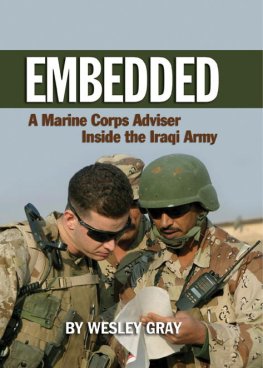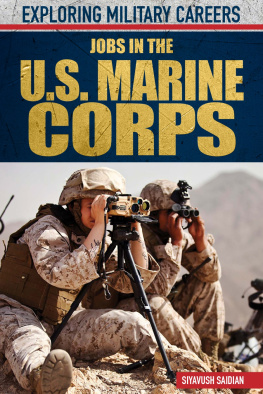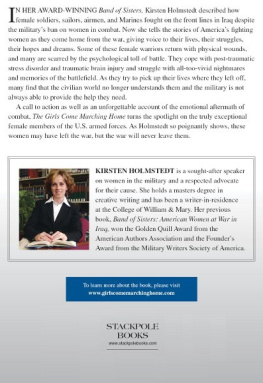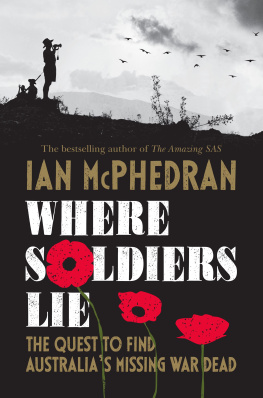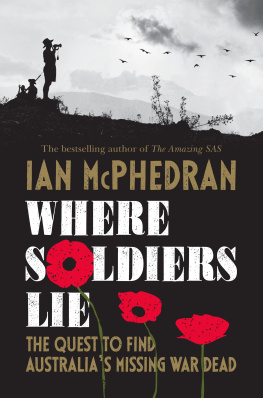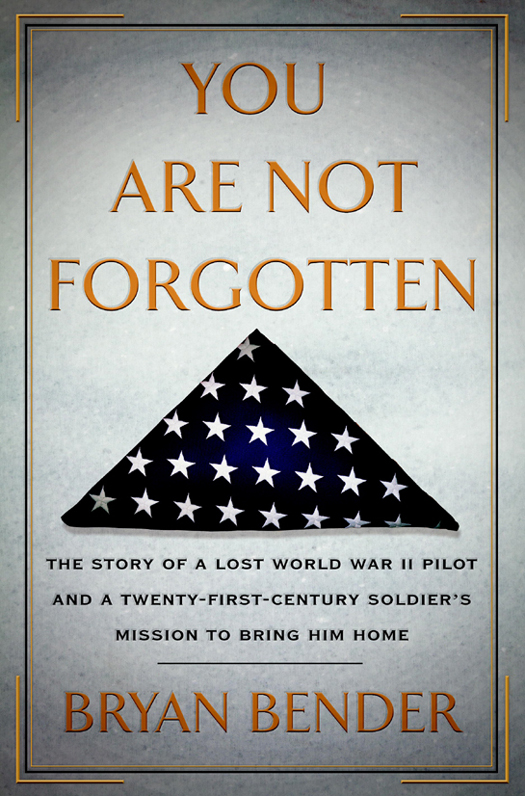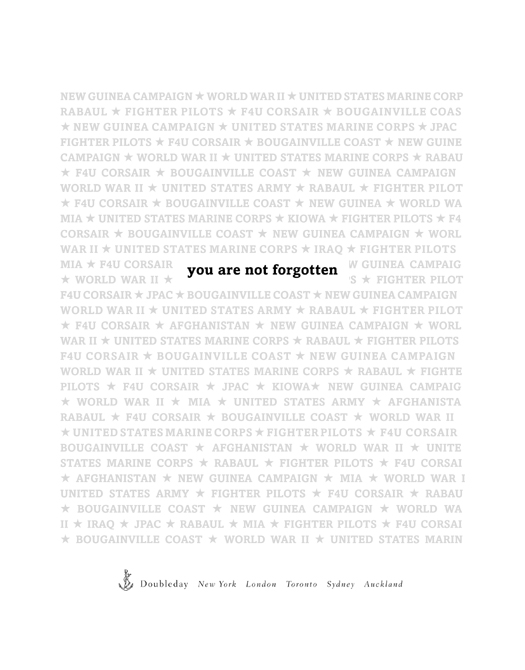THE STORY OF A LOST WWII PILOT
AND A TWENTY-FIRST-CENTURY SOLDIERS MISSION
TO BRING HIM HOME

Bryan Bender
Copyright 2013 by Bryan Bender
All rights reserved. Published in the United States by Doubleday, a division of Random House, Inc., New York, and in Canada by Random House of Canada Limited, Toronto.
www.doubleday.com
DOUBLEDAY and the portrayal of an anchor with a dolphin are registered trademarks of Random House, Inc.
Grateful acknowledgment is made to Houghton Mifflin Harcourt Publishing Company for permission to reprint The Man in the Dead Machine from White Apples and the Taste of Stone: Selected Poems, 19462006 by Donald Hall. Copyright 1990 by Donald Hall. Reprinted by permission of Houghton Mifflin Harcourt Publishing Company. All rights reserved.
Jacket design by Michael J. Windsor
Jacket photogrraph Travel Image UIG/Getty Images
Library of Congress Cataloging-in-Publication Data
Bender, Bryan.
You are not forgotten : the story of a lost WWII pilot and a twenty-first-century soldiers mission to bring him home / Bryan Bender. First edition.
pages cm
1. World War, 19391945Repatriation of war deadUnited States. 2. World War, 19391945Missing in actionPapua New Guinea. 3. Iraq War, 20032011Aerial operations, American. 4. Eyster, George Senseny, V, 1973 5. McCown, Marion Ryan, Jr., 19171944. 6. Air pilots, MilitaryUnited StatesBiography. 7. United States. ArmyOfficersBiography. 8. United States. Marine CorpsOfficersBiography. 9. Joint POW/MIA Accounting Command (U.S.) I. Title.
D810.D4B46 2013
940.5426585092dc23 2012036354
ISBN 978-0-385-53517-5
eBook ISBN 978-0-385-53518-2
v3.1
To Maria Cristina, whose love and support has no ending
And to the one percent, and their families,
who volunteer to serve on our behalf
CONTENTS
It is not the oath that makes us believe the man,
but the man the oath.
A ESCHYLUS
High on a slope in New Guinea
the Grumman Hellcat
lodges among bright vines
as thick as arms. In 1943,
the clenched hand of a pilot
glided it here
where no one has ever been.
In the cockpit, the helmeted
skeleton sits
upright, held
by dry sinews at neck
and shoulder, and webbing
that straps the pelvic cross
to the cracked
leather of the seat, and the breastbone
to the canvas cover
of the parachute.
Or say that the shrapnel
missed him, he flew
back to the carrier, and every
morning takes the train, his pale
hands on his black case, and sits
upright, held
by the firm webbing.
D ONALD H ALL , The Man in the Dead Machine
PROLOGUE
O n an autumn afternoon in 2009, two old friends, both approaching ninety, stood a little taller than usual beneath the glass-paned spire of the National Museum of the Marine Corps. Richard Cosmo Marsh and Eugene Vic Smith slowly lifted their eyes toward one of the restored fighter planes hanging from the ceiling. It was a Corsair, just like the ones they had flown in the South Pacific. Both men were now frail after lifetimes of living, loving, working, and raising large families. But they still burned with the inner fire sparked more than six decades earlier while fending off swarms of Japanese Zeros in a hailstorm of burning metal and lead. The pair of flierstwo of just six surviving members of the forty Hells Angels who set sail for war in September 1943made this pilgrimage to the gleaming new museum in Quantico, Virginia, to complete one final mission.
Cosmo, who had left Yale University to join the Marine Corps after Pearl Harbor, had earned his nickname for his cosmopolitan background. Nearly as wispy as he had been as a twenty-two-year-old lieutenant, he still worked part-time in the Washington, D.C., law firm he co-founded after the war and where he had penned the squadrons newsletter, kept up the Christmas card list, and planned the reunionsthe last one held in California in 2000. On one wall in front of his desk hung a nearly life-sized black-and-white photograph of the Hells Angels, taken in the Solomon Islands in December 1943, all of them young and vigorous and looking invincible as they prepared to enter the jaws of the enemy.
His companion Vic Smith was still the perennially grinning Ohio farm boy who signed up for flight training as a student at Ohio State in the aftermath of the surprise Japanese attack. Though his once-taut muscles had atrophied, he still exuded the pep and wide-eyed exuberance that had made him a squadron favorite. Smitty, as many called him, had flown home after the war in a Stearman biplane, landing on a grass field near his rural boyhood home, where he still lived and helped run his machinery and warehousing businessthat is, when he wasnt traveling to San Diego to visit his grandkids and sail in his beloved schooner. Back in 1987, Vic and his wife had sailed across the South Pacific, returning to the scene of some of those ferocious battles.
Vic and Cosmo had cemented an especially strong bond when they seemed destined to die at Rabaul like so many of their comrades but their fates intertwined to save them both. By late January 1944, the Hells Angels had already suffered many losses. They had been assigned another mission to escort B-25s on a bombing run over the Japanese stronghold on the tip of New Britain Island when Vics Corsair was hit by debris from a nearby Allied plane that was riddled with anti-aircraft fire. He had to ditch in the dreaded channel, and none of his fellow pilots saw where he went down. To avoid being spotted by the Japanese, he waited until nightfall to deploy his lifeboat, floating for hours with only the aid of his life preserver. Night turned to day with no sign of the hoped-for flying boats, or Dumbos, that served as rescue planes. Tuckered out, Vic finally fell asleep under more stars than he had ever seen. He was dreaming of hunting raccoons with his uncle back in Ohio when he was startled awake by the barking of sea lions surrounding his small inflatable raft. He had been resourceful, but he was also lucky. December and January were the only months when the current in St. Georges Channel traveled northwest to southwest, away from Rabaul and the Japanese torturers. All day and through the night, he drifted nearly fifty miles, until he could make out the landmark of New Ireland.
Back at their base in the Solomon Islands, Cosmo took off on another bomber escort. Approaching the target, he experienced engine trouble and also splashed into the channel near Rabaul. This time, his wingman saw where he went down and swooped in to get a better look at the surroundings, taking readings off the nearby mountains. One of the Dumbos was swiftly dispatched to search for him. Along the flight path the crew spotted Vic, still floating in his life raft from the previous day.
The crew landed and swiftly pulled Vic in before continuing on to Cosmos reported position. When it was Cosmos turn to be pulled through the gun ports to safety, Vic greeted his surprisedand doubly relievedfriend with a broad smile. For the rest of his long life Vic liked to quip that the best thing that ever happened to him was that his friend Cosmo had crashed off Rabaul. If he hadnt, he probably never would have been found. He showed his appreciation by making trips to Washington, D.C., every few years to visit his friend in the Maryland suburbs and bought him gifts, such as a winter jacket with the Marine Corps seal on the back.


